

The Apple harvest is drawing to a close, with only the late varieties still to pick!
Talking to industry friends, The English Apple Man learnt that while 'some' second pick Gala is still being picked, the later varieties, Braeburn and Jazz have just started, or will be started over the next 5-7 days.
The apple harvest to date has taken place in near perfect weather. Warm days and and some cold nights have ensured very good red colour and in contrast to the 2013 harvest, picking has been conducted in dry conditions.
In general, Cox has come up a bit lighter (yield) than expected, while Gala is pretty much in line with estimates. Cox quality and fruit size is very good, Gala size is good, but there is more skin russet than usual. I would be surprised if Braeburn falls short of estimates.
Pip to Plate
On Friday last week, The English Apple Man joined industry colleagues and and members of Hadlow College staff and students for the 2nd Pip to Plate event. The inspiration for Pip to Plate; ' educating young people about the apple growing and marketing process, and illustrating the career opportunities in our very modern apple & pear industry. That Hadlow College is the perfect place to gain a Horticultural education in preparation for a career is an important focus.
For the practical 'orchard aspects' the BIFGA 21 Trial Orchard and Huxley Training orchards made a perfect 'classroom environment' for illustrating important stages of the life of an apple on a Pip to Plate journey.
Below: The English Apple Man demonstrates how the 'sweet apple' (Malus pumilla) has its origins in the Tian Shan in western China.
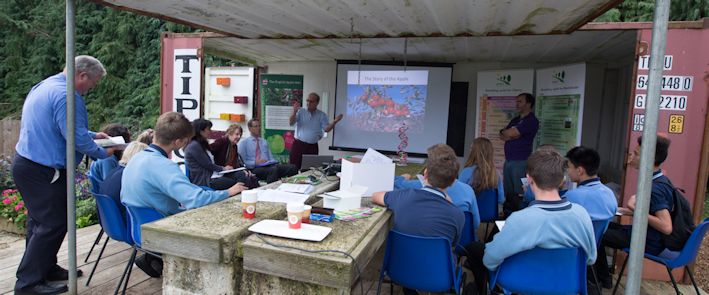
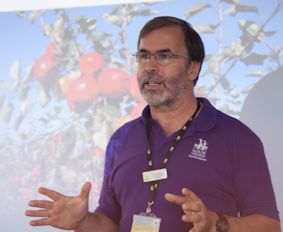 The Story of the Apple is a fascinating one; some years ago my friend Professor Barrie Juniper traveled to the Fruit Forests in the mountains of western China (Tian Shan) and has demonstrated how the sweet apple evolved there. For a deeper understanding, click on The Story of The Apple
The Story of the Apple is a fascinating one; some years ago my friend Professor Barrie Juniper traveled to the Fruit Forests in the mountains of western China (Tian Shan) and has demonstrated how the sweet apple evolved there. For a deeper understanding, click on The Story of The Apple
Second 'on parade' was John Marklew a Hadlow BSc student and trainee lecturer. The EAM and John worked together with John delivering East Malling (EMR) material on apple breeding.
John told the visiting students that EMR uses only traditional breeding methods (no GM) in conjunction with advanced genomic-based marker assisted selection.
The process starts with a 'crossing programme' in which pollen from a 'donor' tree designated the male parent, is applied to the stigma of another tree, designated the female parent. Typically this produces several thousand seeds per year. Once germinated, the seedlings go through various rounds of selection, first in the glasshouse and later in the field, this stage enable individual new varieties with poor characteristics to be discarded. By the time the seedlings have been budded onto root-stocks, 18 months after germination, usually only 10% have passed successfully through the selection process. These trees are then planted out ready for assessment of the fruit and other attributes in years 5-6.
It is not until more than 20 years from selection that a variety will be deemed worthy of a 'name' and released for commercial distribution, then finally released as a new variety. It is usually around 30 years from selection before a new variety finds its way onto retailers shelves.
Below: Hadlow College Lecturer - Stefan Jordan, a key figure behind Pip to Plate with a group of students in the BIFGA Orchard.
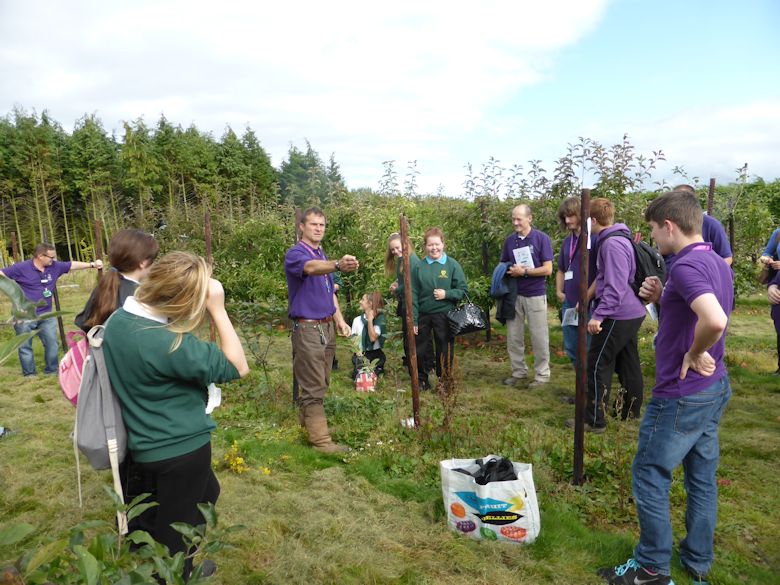
Below left: Nurseryman Will Seabrook gave practical demonstrations of grafting and budding to each school as they made their way around the Pip to Plate process.
Below right: Malcolm Withnall (a former Hadlow College Lecturer and co-author of The Apple Pruning manual) explained the mechanism of tree shape; e.g. the frame on which we grow apples, or; 'the how, what, where, why and when' of apple tree management.
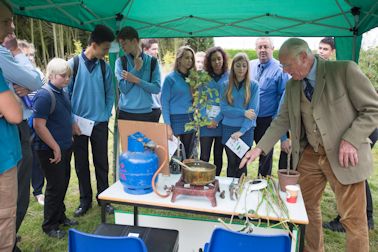
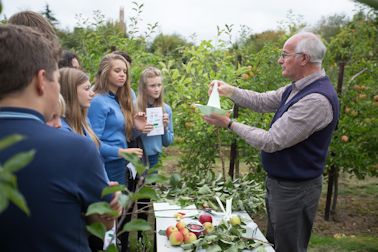
Biology and Chemistry:
Below left: Kirsty Malpass - Hadlow College BSc alumni used Hutchinson's sponsored material - to explain the science of 'Crop protection' - with examples of 'main' named problems to apples (eg. codling, aphids, scab and/or mildew).
Harvest:
Below right: Hadlow College Students led the harvesting module, with pupils from the visiting schools picking apples from the BIFGA 21 orchard. Tasting and discussing the attributes was part of the learning objective.
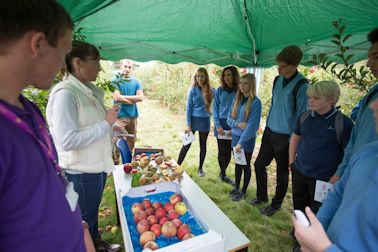
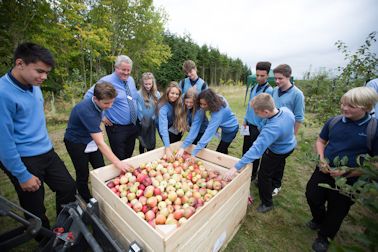
Storage:
Below left: David Bishop from International Controlled Atmosphere (ICA) assisted by Hadlow BSc students, explained The principles of modern apple storage. Below right: Sally Channon BSc student demonstrated the fruit quality tests integral to assessment of apples for storage and marketing.
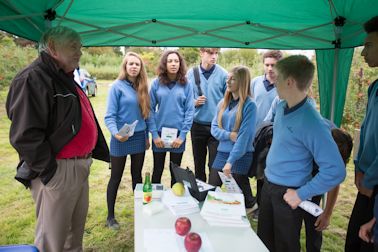
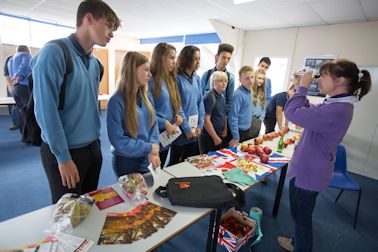
Business - Marketing of the British Apple.
Below left: Simon Cannell - from Chingford Fruit Ltd 'Category Manager' for Sainsburys explained the essential role marketing plays in keeping consumers informed about the produce they buy. Simon said ultimately the role is about understanding what shoppers want and then delivering that product in a simple, exciting or interesting way. Below right: Kathryn Townend - Hadlow College Careers Co-ordinator and Ryan Williams (ABC apprentice) explained the current education and training available at Hadlow College; FE, A Levels, HE and ABC Fruit Apprenticeships and summarised the career opportunities for students after an education at Hadlow.
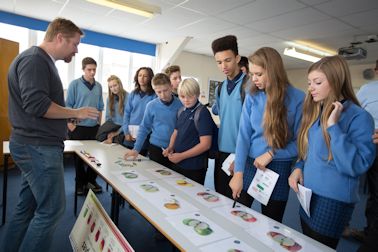
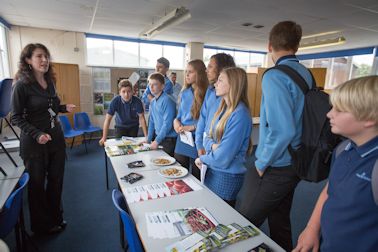
SAINSBURYS
Off the shelf - Dr.Theresa Huxley - Sainsburys Product Technologist and a driving force behind identifying and supporting young people capable of finding rewarding careers in Commercial Horticulture supplied comprehensive material demonstrating the important role Sainsburys plays in British Apple marketing.
Theresa spent the morning at Pip to Plate and with the assistance of Hadlow students and said: 'Did you know' ... Sainsburys sells one in four of British apples sold in the UK and has sold more apples & pears than any other retailer for the last five years. During the British, from August to July Sainsburys offer over 60 varieties of British Apples and Pears.
British sourcing is at the heart of Sainsburys strategy and (quote) "we have committed to doubling the amount of British produce we sell by 2020.
The full details of Sainsburys 2020 commitment can be found on Sainsburys 2020 Vision
The English Apple Man - Comments
" The Pip to Plate event is fast becoming a valuable medium for enlightening young people about the opportunities open to them in the Top Fruit Sector" it is early days, but already a greater awareness exists and this is reflected in more students at Hadlow College showing an interest in a career in the fruit industry.
Following the Pip to Plate event, BIFGA growers were invited to inspect the progress of the new varieties in the BIFGA 21 trial orchard at Hadlow College and the adjacent Huxley 'Cheerfull Gold ' trial orchard.
Two of the 'many' varieties in the BIFGA 21 trial orchard are Jugala (an earlier ripening clone of Gala) and Schniga a Gala clone which has gained popularity
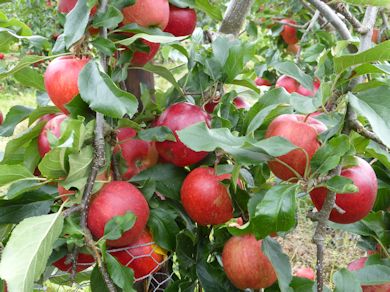
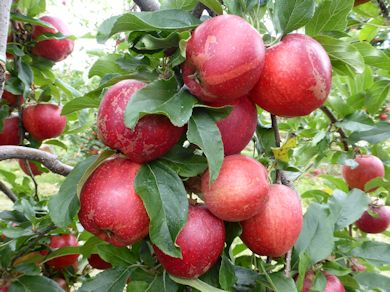
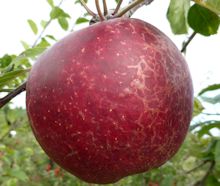
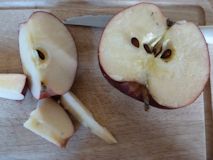 Santana is an apple that has been proposed for consumers with an apple allergy. Recently a formal study suggested of those diagnosed with an apple allergy, 75% were able to eat Santana without any problems.
Santana is an apple that has been proposed for consumers with an apple allergy. Recently a formal study suggested of those diagnosed with an apple allergy, 75% were able to eat Santana without any problems.
However - The English Apple Man recommends any apple allergy sufferers do not eat Santana without careful consideration.
Click to view; Apple Allergy Information
The English Apple Man visits local farm shops
Following last week's visits to all the main Supermarket chains to assess the availability and quality of 'new season' English Apples, The English Apple Man visited a number of Farm Shops in East Sussex and West Kent on Thursday and Friday of this week.
My first visit: Great Park Farm at Catsfield in East Sussex where I purchased a selection of the apples on display.
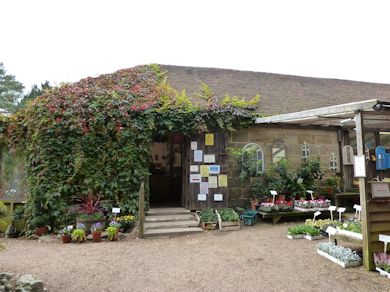
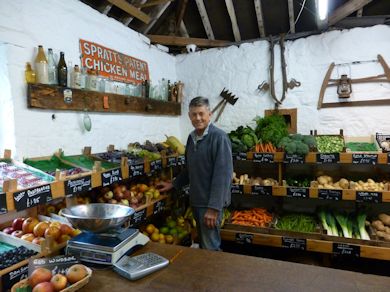
My second visit: Hope Cottage Farm Shop at Hoo Road, Ninfield in East Sussex. There I met Emma Hewitt the owner and purchased some of the apples and pears on display.
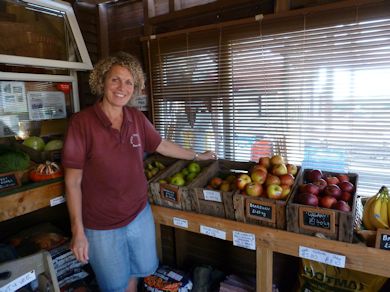
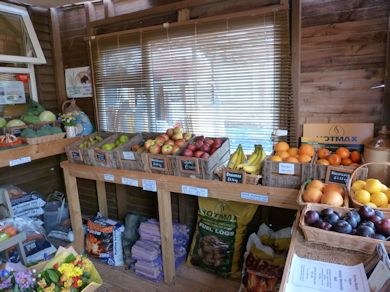
Today; Friday 3rd October, The English Apple Man visited Poppinghole Farm Shop in Robertsbridge, Ringden Farm Flimwell in East Sussex and Freshfields in Westfiield.
Below left: John Dench - Below right: Ringden has a comprehensive collection of home grown varieties. John Dench told me they grow 40 varieties at Ringden Farm.
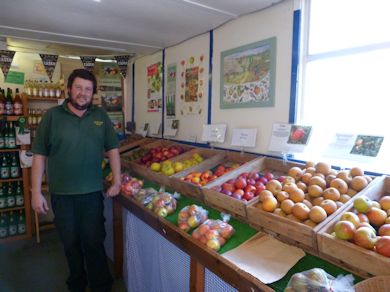
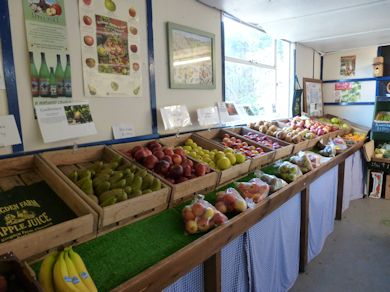
Click to visit the RINGDEN FARM website
The English Apple Man bought apples & pears at each Farm Shop visited and in next week's Journal will appraise each variety x each location!
Take care
The English Apple Man